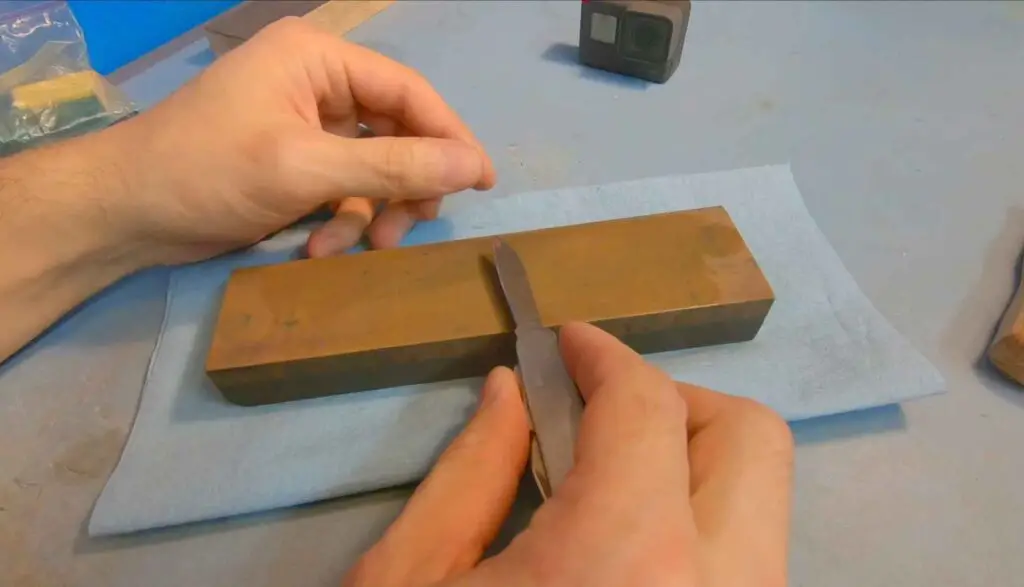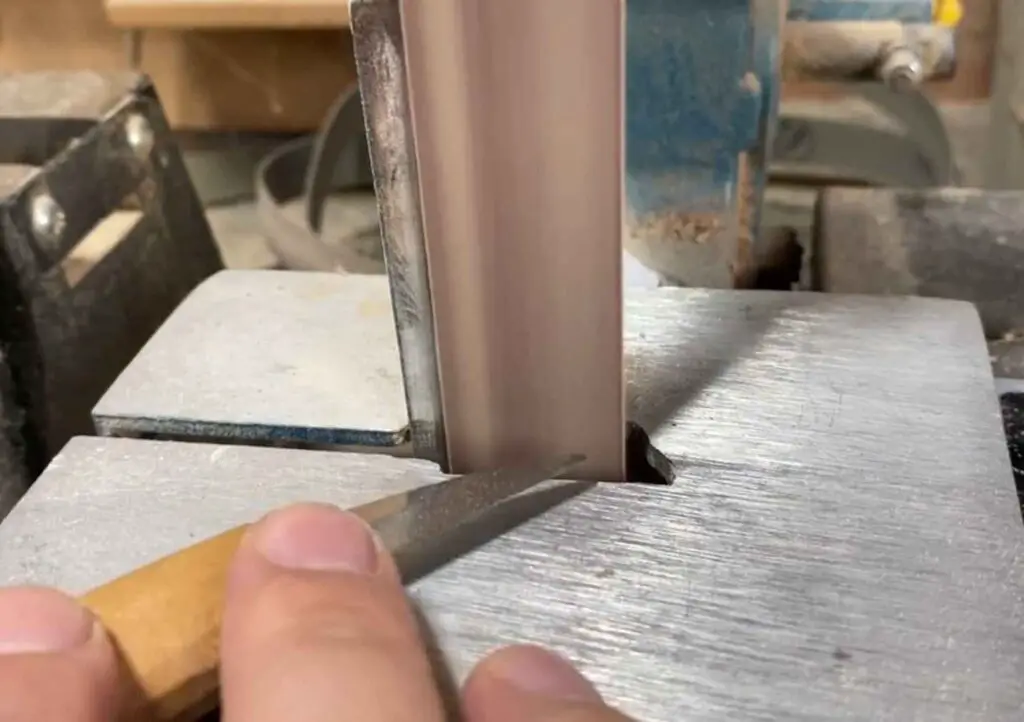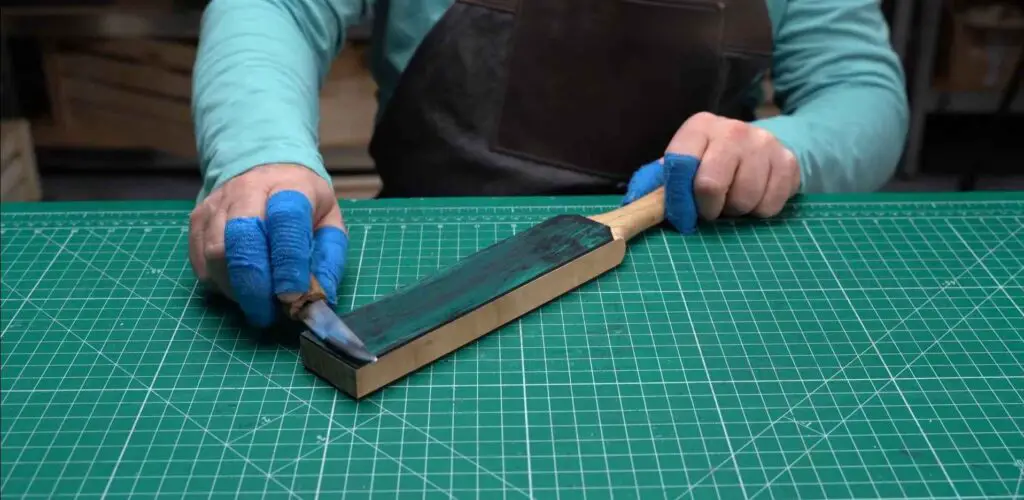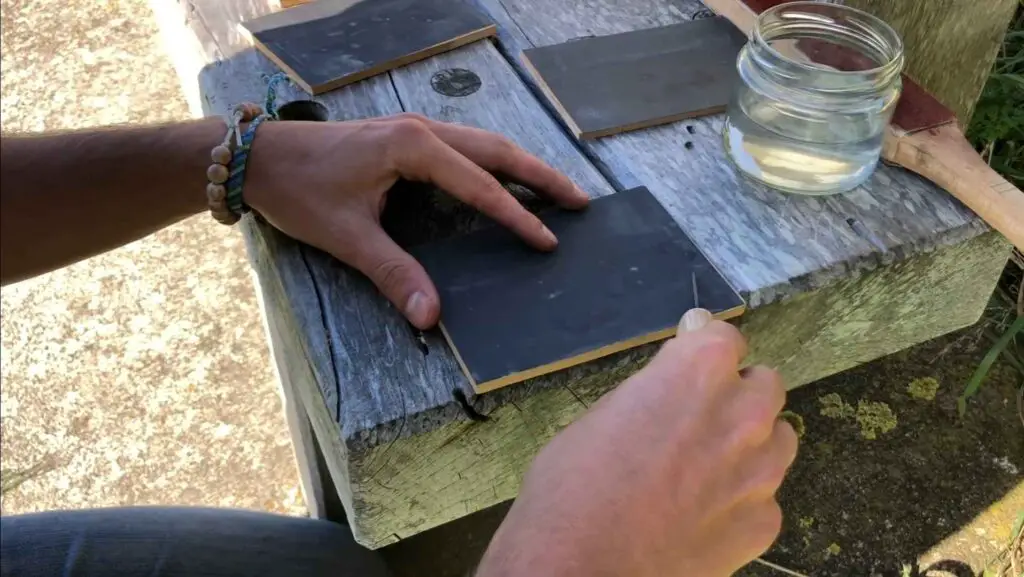A sharp whittling knife is key to successful wood carving. A dull blade will not only make carving more difficult but can also be dangerous. Here are a few tips on how to sharpen your whittling knife:
1. Start with a clean, dry knife. A dirty or wet blade will be more difficult to sharpen and could cause the steel to rust.
2. Use a honing stone or diamond sharpener designed specifically for knives. These stones will help you create a fine, sharp edge on your blade.
3. Hold the blade at a 20-degree angle against the honing stone and use long, even strokes along the length of the blade. Be sure to sharpen both sides of the blade evenly.
4. Test the sharpness of your knife by gently carving into a piece of softwood such as pine or basswood. If the knife is properly sharpened, it should easily carve into the wood without any resistance or tearing.

How Often Should I Sharpen My Whittling Knife?
Assuming you are talking about a knife used for wood carving, there is no definitive answer. It depends on how often you use it and what kind of wood you’re carving. If you’re using it frequently on hardwood, you’ll need to sharpen it more often than if you’re using it infrequently on softwood.
A good rule of thumb is to sharpen when the blade feels dull or when your carving becomes difficult because the blade isn’t cutting as cleanly as it should.
What is the Best Way to Sharpen a Carving Knife?
A carving knife is one of the most essential tools in a kitchen. It is used for slicing meats, vegetables, and fruits. A sharp carving knife makes the job easier and safer.
There are several ways to sharpen a carving knife. The best way depends on the type of knife, the level of wear, and the user’s preferences. The most common way to sharpen a carving knife is with a honing rod or steel.
This method can be done quickly and easily with little practice. First, find the angle you need to hold the blade at by placing it against the honing rod at a 20-degree angle. Second, use short strokes to move the blade back and forth across the honing rod while maintaining that 20-degree angle.
Be sure to hone both sides of the blade equally.
Finally, test the sharpness of your knife by slicing through a piece of paper or hair. If it doesn’t cut cleanly, continue honing until it does.
Another popular way to sharpen a carving knife is with a whetstone or diamond stone. This method takes more time and effort than using a honing rod but can result in a sharper edge.
First, soak your whetstone in water for 10 minutes (or follow the manufacturer’s instructions).
Second, find the correct angle to hold your blade at by resting it on top of the whetstone at about a 20-degree angle.
Third, use long strokes to move the blade back and forth across the whetstone while maintaining that 20-degree angle.
Fourth, flip your blade over and repeat the process on the other side.
Fifth, test the sharpness of your knife by slicing through a piece of paper or hair. If it doesn’t cut cleanly, continue honing until it does. Discussions among Knife enthusiasts often arise as to what is considered to be the best”way to Sharpen a Carving Knife. Different individuals have different opinions based on their own experiences.
How Do You Sharpen a Whittler Knife?

Assuming you are talking about a pocket knife or whittling knife: To sharpen your knife, you will need a sharpening stone. A honing stone is too smooth and will not do the job correctly.
Start by lubricating your sharpening stone with water or oil. Then, hold your blade at a 20-degree angle to the stone and use long, even strokes along the length of the blade. Be sure to keep the same angle throughout the entire sharpening process.
After you have finished stroking the blade on one side, flip it over and repeat on the other side. You should finish with a few very light strokes on each side just to polish off the edge. And that’s it!
Your knife is now sharpened and ready for use.
How Do You Sharpen a Carving Knife at Home?
If you’re looking to sharpen your carving knife at home, you can use a few different methods. One popular method is using a honing rod. To use this method, start by finding a honing rod that’s the same width as your blade.
Then, hold the honing rod at a 20-degree angle to the blade and run the blade down the length of the rod. Repeat this process 10-15 times on each side of the blade. Another common sharpening method is using sandpaper.
To do this, start by finding a piece of sandpaper that’s coarse enough to work with your knife. Then, hold the sandpaper at a 30-degree angle to the blade and run the blade back and forth across it until you’ve achieved a sharp edge.
If your knife is particularly dull, you may need to start with a coarser piece of sandpaper and work your way up to finer grits.
No matter which sharpening method you choose, be sure to test the edge of your knife on something before using it on whatever you’re carving. This will help ensure that you don’t accidentally cut yourself while carving.
How to Sharpen Your Whittling and Wood Carving Knives (Stones, Leather Strops, and Sandpaper)
How to Sharpen Whittling Knife With Leather?
If you enjoy whittling, then you know that having a sharp knife is key to the perfect carve. But how do you keep your knife in tip-top shape? Read on for our guide to sharpening your whittling knife with leather.
First, start by finding a nice piece of thick leather. You can often find scraps at your local craft or hardware store. Once you have your leather, it’s time to get started sharpening.
Lay the leather flat on a sturdy surface and place your whittling knife blade down onto the leather. Apply gentle pressure as you slide the blade across the surface of the leather, moving from one side to the other.
Keep the blade at a consistent angle as you sharpen – we recommend about 30 degrees.
After a few strokes, flip over your knife and check your work. If you see metal shavings on the backside of the blade, then you’re doing it right! Continue stropping until both sides of the blade are nice and sharp.
And that’s all there is to it! With just a bit of time and effort, you can easily sharpen your whittling knife using nothing but some scrap leather.
How to Sharpen Whittling Knife With Sandpaper?

If you’re looking to sharpen your whittling knife, sandpaper is a great option. All you need is a piece of sandpaper and something to hold it in place (we recommend an old magazine). Start by folding the sandpaper in half so that it’s more manageable.
Then, holding the knife at a 20-degree angle, move the blade back and forth across the sandpaper. Be sure to use even strokes, and don’t press too hard – you don’t want to damage the blade. After a few minutes of sharpening, check your knife to see if it’s as sharp as you’d like.
If not, continue sharpening until it reaches your desired level of sharpness.
How to Sharpen a Whittling Knife With a Stone?

A whittling knife is a small, sharp knife used for carving wood. The most important part of caring for your whittling knife is keeping the blade sharp. A dull blade can make carving difficult and even dangerous.
This blog post will show you how to sharpen your whittling knife with a stone. If you’ve never sharpened a knife before, don’t worry! It’s easy to learn with a little practice.
Start by finding a sharpening stone that suits your needs. We recommend using a medium-grit stone for general-purpose sharpening and a fine-grit stone for finishing touches. You’ll also need some lubricant – water or oil will work fine.
Soak your stone in water (or oil) for 5-10 minutes. This will help to keep the stone from getting too hot during use. Next, place the stone on a flat surface and position your knife so the blade touches the stone at a 20-degree angle.
Apply light pressure as you move the blade back and forth across the stone; be sure to keep the same angle throughout each stroke. Continue until you’ve achieved a nice, even edge on both sides of the blade. Now it’s time to use your newly sharpened whittling knife!
How to Sharpen a Curved Whittling Knife?
If you’re looking for a simple way to sharpen your curved whittling knife, this guide is for you. You only need a sharpening stone and some water (or honing oil). Start by holding the blade at a 20-degree angle to the stone.
Use light pressure and work the entire blade from hilt to tip in a sweeping motion. Keep the edge of the blade flush with the surface of the stone. Next, increase the angle to 30 degrees and repeat the process.
Again, use light pressure and work the entire blade. Remember to keep the edge of the knife flush with the stone. Finally, increase the angle to 40 degrees and repeat the process one last time.
Once again, use light pressure while working from hilt to tip in a sweeping motion. When you’re finished, your knife should be nice and sharp!
How to Sharpen a Wooden Knife?
If you’re like most people, you probably use your knives on a daily basis. Whether you’re slicing fruits and vegetables for dinner or opening packages, having a sharp knife is essential for both safety and efficiency.
But over time, even the best blades will become dull with regular use.
When this happens, it’s time to sharpen your knife! There are a few different ways to sharpen a wooden knife, but we’ll focus on the two most common methods: using a honing rod or using sandpaper. Let’s get started!
Honing rods are long, thin pieces of metal that can quickly and easily sharpen your knives. They come in steel and ceramic varieties, each with its own benefits.
Steel honing rods are less expensive than their ceramic counterparts, but they can also damage your knife if used incorrectly.
Ceramic honing rods are more expensive, but they’re much gentler on your knives and won’t damage the blade if used correctly. To use a honing rod, start by finding the right size for your knife blade.
Then, hold the rod in one hand and place the heel of your blade against the top of the rod. Next, tilt the blade at a 20-degree angle and draw it down the length of the rod towards you. Be sure to apply even pressure as you do this; if you press too hard, you risk damaging your blade.
Finally, turn your blade over and repeat on the other side. After a few strokes on each side of your blade, it should be noticeably sharper!
Wood Carving Knife Sharpening Angle
If you’re a wood carver, then you know that having a sharp knife is key to being successful. But what’s the best way to sharpen your wood carving knives? In this blog post, we’ll give you some tips on how to find the perfect sharpening angle for your knives.
One of the most important things to keep in mind when sharpening any knife is to find the right angle.
With a wood carving knife, you’ll want to use a relatively low angle – around 15 degrees is ideal. Using too high of an angle can cause your knife to chip and break, which is obviously not ideal!
Another important tip is to ensure you’re using a sharpening stone appropriate for your knives. A lot of people make the mistake of using a honing stone, which is actually meant for finer blades like kitchen knives. Sharpening stones are much coarser and will help keep your wood carving knives in good shape for longer.
Finally, it’s important to remember that practice makes perfect! The more you sharpen your knives, the better you’ll get at finding that perfect angle. So don’t be discouraged if it takes a bit of time to get it right – just keep at it and eventually, you’ll be an expert!
How to Sharpen Wood Carving Tools?
If you’re a wood carver, then you know how important it is to have sharp tools. Carving with dull tools can be difficult, time-consuming, and even dangerous. So in this blog post, we’ll show you how to sharpen your wood carving tools so they’re always ready for use.
Two main ways to sharpen wood carving tools are by hand or with a machine. If you’re starting, we recommend sharpening by hand. It’s not as fast as using a machine, but it’s much easier to learn and get the hang of.
Plus, it doesn’t require any special equipment – just a few common household items you probably already have. Here’s what you’ll need to sharpen your wood carving tools by hand:
– A honing stone: This is the most important tool for sharpening wood carving tools by hand.
Honing stones come in different shapes and sizes, so choose one that’s comfortable to hold and use. We recommend starting with a medium-grit stone; if your tools are dull, you may want to use a coarse-grit stone first and then move on to a finer one.
– Water: You’ll need water to lubricate the honing stone and keep it from clogging up with metal shavings.
– A strop: A strop is optional but helpful; it’s basically like a piece of leather that you drag the blade of your tool across after sharpening on the honing stone. This helps further polish the edge of the blade and make it even sharper.
Now that you have all of your supplies gathered, let’s get started!
1) Wet the honing stone with some water – just enough to lubricate it without making it too wet or slippery.
2) Place your tool against the honing stone at about a 20-degree angle (or whatever angle feels comfortable for you). Apply moderate pressure as you move the blade back and forth across the surface of the stone (think “shaving” rather than “sawing”).
Work slowly at first until you get a feel for how much pressure to apply; then increase your speed if desired.
After each stroke, lift the blade away from the hone before moving back again – this prevents nicks in the blade caused by accidentally crossing over areas that have already been Sharpened.
Conclusion
If you want to know how to sharpen whittling knife, then this blog post is for you. It provides detailed instructions on how to do it, step-by-step. By following these steps, you can easily sharpen your whittling knife and keep it in good condition.